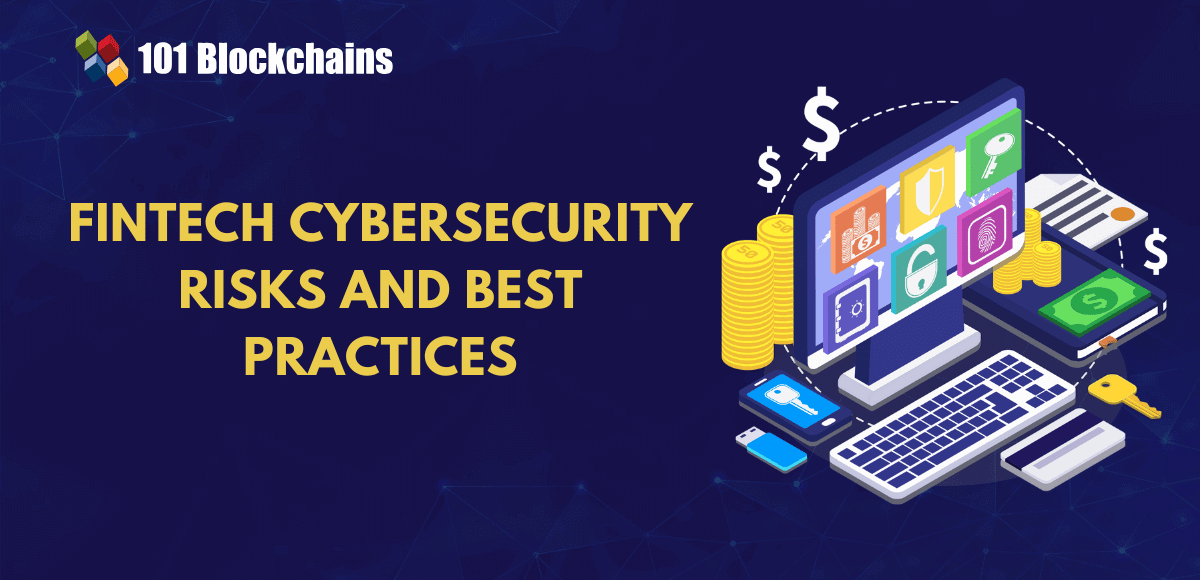Learn how blockchain truly works, master key definitions, and uncover what makes smart contracts so "smart." Dive into the fundamentals, gain valuable insights, and start your blockchain journey today!

- Career Guide
Georgia Weston
- on May 22, 2023
How To Get Into Fintech: An Ultimate Career Guide
Fintech, or financial technology, is one of the most noticeable disruptions in the domain of banking and financial services. Most of you reading this article to find answers to ‘How to Get into Fintech’ should also know about the ideal approach to build your fintech career. New technological advancements have offered viable solutions for transforming the way people use financial services.
Interestingly, the common assumptions suggest that fintech has emerged in recent times. On the contrary, fintech has been around for quite some time. Have you ever used a credit card to make payments? If your answer is yes, then you have used fintech for your benefit. Let us learn more about the best practices for landing with desired job in the field of fintech.
Excited to explore the impact of technology on financial services? Enroll Now in the Certified Fintech Expert (CFTE)™ Certification Course Now!
Why Should You Look for Careers in Fintech?
The best way to answer your question would point to a detailed overview of fintech and its potential use cases. Financial technology, or fintech, revolves around using technology for automation of financial services. You can work in fintech roles to contribute to the growth and expansion of the sector. The common types of tools in the fintech ecosystem include mobile payment solutions, online lending platforms, and personal finance management apps.
Mobile payment systems have revolutionized digital payments with flexibility for making payments through smartphones and other mobile devices. Similarly, online lending platforms can help in connecting borrowers directly to lenders without any intermediaries in between. As a fintech professional, you may come across apps for personal financial management use cases.
Personal finance management apps have delivered favorable results by helping people with management of their finances in budgeting, investing, or savings. Each application of fintech proves that fintech skills can help you usher in a new era of financial services. Some of the notable examples of fintech companies include PayPal, Stripe, Robinhood, Uniswap, and many other popular names. Fintech experts are likely to find more opportunities for landing jobs in the domain of financial technology.
Are you ready to take your career to the next level? Join our Premium plan now and get access to exclusive web3 & blockchain job listings on 101 Blockchains.
Scope for Employment Opportunities in Fintech
The effect of fintech on the world has led to the creation of many new jobs. You should also look for opportunities to pursue a career in fintech by learning the vital skills for fintech. Fintech provides an exclusive platform for finding job opportunities and delivers the potential for working with new and innovative technologies. Professionals can use cutting-edge technology to transform financial services with new and better offerings.
The jobs in fintech offer versatile choices ranging from software engineers to product managers. As a software engineer in fintech, you would have to create fintech applications and their backend systems. Product managers work on identifying innovative ideas for development and distribution of new fintech offerings. On top of it, you can explore many other job roles in data science, sales, and marketing for the domain of fintech. The flexibility for pursuing a specific career path in the world of fintech is a vital pointer for building your fintech career.
Another important factor beyond the availability of different types of jobs is the salary estimate. How much can you earn as a fintech professional? The review of fintech salary estimates can help you identify whether the fintech career opportunities align with your goals. Interestingly, the remuneration for fintech professionals is the most crucial factor for any beginner who wants to become a fintech expert.
Fintech professionals can earn an average annual salary of almost $113,000 in entry-level roles. On the other hand, specialization in fintech can help a professional earn around $130,000 to $150,000 per year. Some of the highest paying job positions in fintech include Chief Financial Officer or Chief Technology Officer.
Want to become familiar with Fintech and its working? Join the Standard & Premium Plans and Enroll Now in Fintech Fundamentals Course!
Important Skills Required for Jobs in Fintech
The salary estimate and wide range of jobs available with fintech can encourage candidates to start their fintech training journey. At the same time, it is also important to learn fintech skills required for addressing your responsibilities as a fintech professional. You can come across a broad set of skills required for jobs in fintech, depending on the specific job role. However, you should also prepare for common skills required for every role in the field of fintech. Here are some of the common skill requirements for validating your identity as a fintech professional.
- First of all, candidates preparing for fintech jobs must learn about the financial services market and solutions in the fintech ecosystem. You must have in-depth knowledge regarding investment markets, banking services, portfolio management, and other essential aspects of financial services.
- Another addition among the basic skills required for jobs in fintech refers to technical knowledge. What are the technologies you need to learn to become a fintech professional? Web and mobile app development, cybersecurity skills, and fluency in blockchain technology, artificial intelligence, and web3 are some of the prominent technical skills for fintech professionals.
- The responses to “How do I become a fintech expert?” would also revolve around problem-solving capabilities of the candidate. Fintech aims to resolve the existing issues in financial services through a comprehensive analysis of complex business issues.
- Finally, aspiring fintech professionals would also need soft skills such as communication, teamwork, and adaptability. Fintech experts should have the ability to collaborate with different stakeholders in fintech organizations or projects. On top of it, adaptability ensures that fintech professionals can adapt to the continuously fluctuating market conditions.
Eager to know about important skills you need to become a fintech professional? Check the detailed guide now on The Most In-Demand Skills For Fintech
How Can You Become a Fintech Professional?
The career prospects in fintech and growth of the industry point out the favorable prospects for career development in fintech. In addition, the transferability of fintech skills ensures that you can use them in other job roles. At the same time, salary estimates for fintech professionals also showcase a valid reason to pursue training and certification in fintech. However, you must follow a structured approach to achieve your career objectives in fintech. Here are some of the proven steps recommended by experts for becoming a fintech professional or expert.
-
Start with Skill Development
The best thing about pursuing a career in fintech is that you can start working on skill development directly. Most beginners have doubts regarding the first point of entry into the fintech space. You can find better opportunities for employment in the fintech space with a set of in-demand skills. The review of basic skills required for fintech roles shows a clear impression of the significance of technical skills.
The examples of technical skills required for jobs in the domain of fintech would include programming, cybersecurity, machine learning, artificial intelligence, operations, and data analytics. In addition, you can also work towards improving your skills for top positions in the domain of fintech with blockchain and web3 technology.
You should also work on developing your skills for communication and leadership. The most popular fintech courses online could help you familiarize yourself with the importance of soft skills, such as a mindset for innovation and teamwork. On top of it, skills for problem-solving, negotiation, and time management are also important requirements in the fintech job market.
Aspiring to make a lucrative career as a Fintech expert but not sure how? Check the detailed guide Now on How To Become Fintech Certified Expert?
-
Work on New Skills and Trends
The most striking characteristic of the fintech industry is the rapid evolution of products and services in the domain. You have to follow a dynamic learning approach to establish a strong base in the domain of fintech. The answers to “How to get into fintech” should also focus on the necessity of staying updated with latest trends.
Some of the new trends in fintech include embedded finance, super apps, and web3. Candidates with knowledge in these areas are more likely to garner the attention of employers. For example, web3 fluency of a candidate ensures that they have a clear understanding of building the next generation of decentralized fintech solutions.
At the same time, candidates should also choose fintech courses that can help them familiarize themselves with concepts of embedded finance. It can provide an effective choice for non-financial organizations to utilize the benefits of financial technologies in their operations.
Therefore, you can safeguard your fintech career for the future by learning about new trends. Fluency in new fintech trends such as decentralized apps, web3 principles, and tokenization can offer promising advantages for career development in fintech.
-
Professional Networking Opens New Doors
The search for answers to “How do I become a fintech expert?” would also lead you to the importance of professional networking. Networking can help you establish your footprint in the fintech labor market. The advantages of networking with industry professionals not only help you land new jobs but also deliver an opportunity to learn from their expertise. You can explore some of the best suggestions for professional networking in the fintech industry, such as fintech events, job fairs, and conferences.
One of the easiest ways to begin your professional networking in fintech is through LinkedIn, a trusted professional networking platform for millions of users worldwide. LinkedIn offers a flexible choice for exploring the profiles of industry experts and professionals in the world of fintech.
You might strike up a conversation with a professional on LinkedIn, and the conversation can snowball into a job offer for you in a fintech project. With the right set of skills, you can use new methods of professional networking to reach out to employers.
-
Choose Effective Training Courses and Certifications
The term ‘effective’ could have different meanings for different learners. If you want to earn a lucrative fintech salary estimate, then you must prepare for the efforts required to become a professional. First of all, you must invest time in professional training courses to learn about financial technology.
For example, a course on blockchain or fintech fundamentals can be the starting point of your learning journey. Gradually, you have to move towards advanced courses dealing with topics such as smart contract development and web3 use cases in fintech.
Once you have learned the technical aspects of fintech, you need to choose training courses that can prepare you for managing business-level changes. For example, you should look for fintech courses on business model innovation. Such courses can help you identify how organizations can adopt fintech with changes in the existing business model.
Finally, you have to look for certification training courses that help you prove your skills and knowledge of fintech. Certification training courses are useful tools for adding credibility to your efforts for a job in fintech. Employers can use certifications for choosing fintech professionals in the case of certain job positions with a broader set of responsibilities.
Build your identity as a certified blockchain expert with 101 Blockchains’ Blockchain Certifications designed to provide enhanced career prospects.
-
Build Practical Experience and Market Your Identity
The most important requirement for becoming a fintech expert is the ability to market yourself. You can build your career in fintech only if you are successful in attracting the attention of employers. Nobody is going to come looking for you just because you have a fintech certification.
On the contrary, you must make an effort to sell yourself in the job market. Start by building a great resume with all your academic details and fintech skills. You can improve your resume by participating in internships for fintech companies or working in entry-level roles on fintech projects. The experience of working on practical fintech projects can make employers believe that the candidate can deliver value for their projects.
You can also work your way towards your desired fintech jobs by creating your identity as a fintech expert. For example, you can start a blog on fintech topics and communicate your views about latest trends on the blog. In addition, contributions to discussions on fintech in different virtual forums can also strengthen your reputation as a fintech expert.
Conclusion
The outline of best practices for becoming a fintech professional shows that you can enjoy promising benefits. The average fintech salary can range from $110,000 to $150,000, depending on the specialization. It is important to note that fintech is a consistently expanding industry with a massive skill gap.
At the same time, new technology trends such as blockchain and web3 have also registered their influence on fintech. You can utilize the opportunities in the fintech market to build a rewarding career path. Learn more about fintech fundamentals and become a certified fintech expert right now.
*Disclaimer: The article should not be taken as, and is not intended to provide any investment advice. Claims made in this article do not constitute investment advice and should not be taken as such. 101 Blockchains shall not be responsible for any loss sustained by any person who relies on this article. Do your own research!





